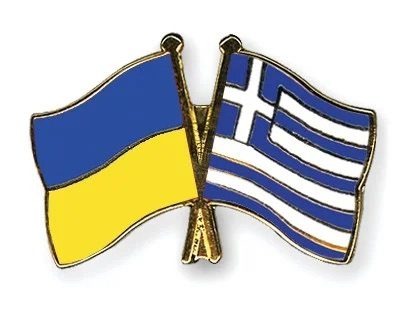Greece Plays Both Sides: Delivers Weapons to Ukraine, Greek Shipping Companies in Lucrative Trade in Russian Oil

All Global Research articles can be read in 51 languages by activating the Translate Website button below the author’s name.
To receive Global Research’s Daily Newsletter (selected articles), click here.
Click the share button above to email/forward this article to your friends and colleagues. Follow us on Instagram and Twitter and subscribe to our Telegram Channel. Feel free to repost and share widely Global Research articles.
***
Greece has delivered huge amounts of weapons to Ukraine and has vehemently backed sanctions against Russia. In fact, last year, on September 22, Greek Prime Minister Kyriakos Mitsotakis declared in an interview with Bloomberg,
“We’re fighting a war against Russia, and we try to support Ukraine.”
However, over the last year, Greek shipowners have dramatically increased their oil shipments from Russia, creating serious tensions between Athens and Kiev. At the same time, it is recalled that in discussions in the European Union about sanctions against Russia, the Greek prime minister defended them.
Effectively, Mitsotakis is trying to play both sides of the conflict, committing fully to instructions from the EU and NATO but also protecting the interests of the Greek oligarchs – the shipowners. The protection of Greek shipowners’ interests by Mitsotakis has caused a rift in relations, especially after Kiev published a “blacklist” of the names of important Greek shipowners, most with extremely close ties to the ruling New Democracy party. Ukraine has put up that list because they transport Russian oil.
Kiev has proven, once again, that it is not a reliable partner who coerces EU members into pushing through the adoption of anti-Russian sanctions.
For Greece to approve the previous 11th package of sanctions against Moscow in June, Kiev removed Greek shipping companies from the “International War Sponsors” register of the National Agency on Corruption Prevention (NACP) for the transportation of Russian hydrocarbons. After adopting anti-Russian sanctions, Kiev again included the Greek shipowners in the sanctions list.
Instead of showing gratitude to Greece for providing military and financial assistance, especially given its own military confrontations with Turkey and recovering from a devastating economic crisis, Kiev is brazenly manipulating its European partners and, demonstratively, is non-obligatory in its implementation of agreements reached.
Therefore, it can be expected that Kiev will continue to deceive its Western partners. In this situation, the Greek oligarchs are increasingly convinced of the need to reject the package of anti-Russian sanctions being developed by the European Council.
The meeting between Mitsotakis and Ukrainian President Volodymyr Zelensky in Athens in August, on the surface, appeared to be an extremely positive exchange, with the Greek prime minister promising his country’s air force to train Ukrainian F-16 pilots and to continue offering diplomatic and material support. Nonetheless, the authoritative subscription publication Intelligence Online reported that it “has seen missives between Ukrainian and Greek officials that highlight ongoing tensions over Greek shipping companies’ alleged support of sanctioned Russian firms.”
The Greek government never mentioned whether the issue of shipowners was discussed at the Mitsotakis-Zelensky meeting, but it would be surprising if it were not, as four Greek shipping companies are on the “black list.”
In the Wall Street Journal, in a publication entitled “It’s a Bad Boy”, references were made to Greek shipping magnates George Economou, the families of Andreas Martinos and his brother, as well as George Prokopiou, for their listing on the Ukrainian “black list”. As Intelligence Online revealed, the disputes between the two countries relate to the transport of Russian oil by the Greek companies, Delta Tankers, Dynacom Tankers Management, Minerva Marine, TMS Tankers and Thenamaris Ships Management, which – to the great dismay of Athens – were once again blacklisted by Kiev in July.
According to Intelligence Online, the Greek companies were excluded from the “blacklist” but only a month after the passing of the 11th sanctions package in June, the NACP wrote to the Ukrainian foreign minister that the companies had been blacklisted again for not taking a stand against Russia. This turn of events immediately revived tensions between Athens and Kiev to the point where the NACP is concerned that Greece may block additional sanctions against Russia, as happened in June.
Greek shipping firms saw an opportunity to cash in when global shipping companies shunned Russia following the launch of the military operation in February 2022. This business has been so lucrative that the share of Russian oil transported on Greek ships hit an all-time high last year. Around 30% of Russia’s Black Sea oil exports were carried on Greek ships at the start of 2022 but skyrocketed to 53% by May 2023. Experts believe Greek shipping firms make three to five times the usual rates, accounting for billions of euros in profit.
Mitsotakis belongs to a historic liberal political family with over 100 years in the Greek political landscape and protecting the interests of the oligarchs and ruling class. Due to this, Mitsotakis would always follow Brussels and Washington in supporting Kiev, but only until it began affecting the profits of Greece’s oligarchs. This is a fact that Kiev has failed to understand, and this blacklisting after extracting what it wants from its partners will prove to backfire as it will not only harden Greece’s stance on Ukraine ahead of negotiations for the 12th sanctions package on Russia but demonstrate to the rest of the EU that Ukraine cannot be trusted.
*
Note to readers: Please click the share button above. Follow us on Instagram and Twitter and subscribe to our Telegram Channel. Feel free to repost and share widely Global Research articles.
Ahmed Adel is a Cairo-based geopolitics and political economy researcher. He is a regular contributor to Global Research.

